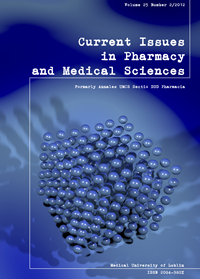The influence of starch hydrolysates on properties of suspensions
DOI:
https://doi.org/10.12923/j.2084-980X/25.2/a.17Keywords:
starch hydrolysate, density, dynamic viscosity of suspension, drug release, progesteroneAbstract
Using modified starch in suspensions is commonly practiced in food, pharmaceutical and other industries [3, 6]. The purpose of this study was to investigate the influence of starch hydrolysates, received according to our prescription, on properties of suspensions. Prepared suspensions Z01 – Z05 with PR, as the model drug, were examined for physical tests. The addition of 20 % SH2 or SH4, as suspending agent, increased the stability of preparations (0.04 cm/day and 0.05 cm/day, respectively). Drug release test according to extraction method was conducted during 24 hours. The ethanol used in acceptor medium increased the amounts of released progesterone. The received results confirm an opportunity of using starch hydrolysates as cheap and safe agents modifying physical properties of suspensions.
References
1. Czarnecki W. Belniak P.: Sposób otrzymywania krótkołańcuchowego polisacharydu. Biuletyn Urz. Patent. 4, 13, 2007,
2. Chorny M. et al.: Study the drug release mechanism from tyrphostin AG-1295-loaded nonospheres by in situ and external sink methods. J. Cont. Release 83, 401, 2002,
3. Freire A.C. et al.: Starch-based coatings for colon-specific drug delivery. Part I: The influence of heat treatment on the physico-chemical properties of high amylose maize starches. J. Pharm. Biopharm. 72, 574, 2009,
4. Mc Callion O. et al.: Nebulisation of monodispersible latex sphere suspensions in air-jet and ultrasonic nebulizers. Int. J. Pharm. 133, 203, 1996,
5. Martin A. editor (1969): Physical pharmacy. Lea & Febiger Phyladelphia; p. 519
6. Ntawukulilyayo J.D. et al.: Stabilisation of suspensions using sucrose esters and low substituted n-octenylsuccinate starch – xanthan gum associations. Int. J. Pharm. 128, 73, 1996,
7. Piao H. et al.: A novel solid-in-oil nanosuspension for transdermal delivery of diclofenac sodium. Pharm. Research 25, 896, 2008,
8. Pignatello R.. et al.: Preparation and characterization of eudragit retard nanosuspensions for the ocular delivery of cloricromene. Pharm. Sci. Tech. 7, 27, 2006,
9. Polish Pharmacopeia, 8th edition, Warsaw 2008,
10. Pongpeerapat A. et al.: Formation mechanism of colloidal nanoparticles obtained from probucol/PVP/SDS ternary ground mixture. Int. J. Pharm. 352, 309, 2008,
11. Sethia S., Squillante E.: Solid dispersion of carbamazepine in PVP K30 by conventional solvent evaporation and supercritical methods. Int. J. Pharm. 272, 1, 2004,
12. Schiermeier S., Schmidt P.Ch.: Fast dispersible ibuprofen tablets. J. Pharm. Sci. 15, 295, 2002,
13. Unruh T. et al.: Investigations on the melting behaviour of triglyceride nanoparticles. Colloid Polym. Sci. 279, 398, 2001,
14. Yasueda S. et al.: Evaluation of ophthalmic suspensions using surface tension. J. Pharm. Biopharm. 57, 377, 2004.
Downloads
Published
Issue
Section
License
Copyright (c) 2012 Authors

This work is licensed under a Creative Commons Attribution-NonCommercial-NoDerivatives 3.0 Unported License.


